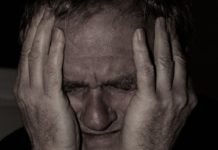Falling Through the Cracks
I am an award-winning singer/songwriter with a number one record to my credit. I also owned several small businesses and founded a 501c3 non-profit for women's health. I ate healthy, swam and cycled every day and had a very active lifestyle. This was before benzos came into my life.
The Gauntlet of Protracted Benzodiazepine Withdrawal
My doctor insisted that my symptoms could not be associated with withdrawal – they had to be symptoms of an underlying condition. I have since learned from legitimate sources that protracted withdrawal syndrome from benzodiazepines can intensify long before it abates, with some symptoms lasting for years.
My Story and My Fight Against Antidepressants, Part II
Healing mental health issues through correct supplements as well as nutrition is, I believe, the final factor for me in my journey. This is possibly what was missing in my first attempt at coming off, and why my brain and body couldn’t handle the extreme anxiety I felt in December 2013. I am ensuring that as I prepare to taper off the Lexapro in 2015, my brain and body are being supported in every way possible.
Polypharmacy Poisoning, Dependence and Recovery from the Psychiatric Paradigm
It took surviving all of the symptoms of benzodiazepine withdrawal, including derealization, gastritis, auditory hallucinations, wasting, dementia, panic attacks and profound depression, for me to come to understand that not only had I really been a cool person before all that shit, but also that nothing was wrong with me. I was smart and a little neurotic at times, but that was it. Drugs caused me to be mentally ill where I had not been before.
Today: 5 Years Free From the Psychiatric Drug Cocktail
It's been five years today since I completed a six year withdrawal process from a large cocktail of psychiatric drugs. Today is also my 50th birthday which, frankly, seems much more remarkable to me at this point. Inside I am only aware of eternal youth. Upon having done an informal and small survey, it seems most people feel that way though it's not talked about much among the adults of our species. That which watches and experiences our lives in these bodies does not age. It's actually a wonderful thing. So I'm here wondering what comes next in this amazing trajectory which is the life being lived in this body that my parents called Monica.
One Gutsy Woman
The childhood and psychiatric abuse altered my neurological, hormonal and other bodily functions and it was difficult to say which abuse left what mark. The doctors used medication to fix the changes and the taking of prescription pills became a habit. I took pills to calm me, pills to sleep, and pills to make me happy. A few months after stopping all medications, I was a bundle of nerves and I opened the cupboard for a pill. Living on autopilot as I had been doing for so long had to stop. I switched gears from absentmindedly resorting to pills, to purposefully calming myself without using drugs by breathing the way the psychologist had taught me.
From Surviving to Thriving: Unleashing Creativity
There were days that I’d wake up and all I could do was cry for no particular reason, just another miserable day of withdrawal. However, the idea of taking photos would get me out of the house. Especially on those days, the absolutely only thing that would get me to move at all was the idea of taking photos. One particular day, I was just crying, crying, crying, and as soon as I got to a beautiful spot that I loved, I stopped crying, took photos, and felt at peace. I even found that the days I felt the worst were the days I took the best photos.
On the Other Side
It was the first time in my Klonopin journey it occurred to me the problem might not be inherent in me. The problem might actually be the Klonopin. Convinced my very life was at stake, I made the firm decision to get off the stuff once and for all.
My Story of Benzo Withdrawal and Activism
My story starts in 1976. I had a nervous breakdown whilst studying for my Accountancy Technician examination. I was then prescribed a series of benzodiazepine/anti depressant drugs for 5 years. I have been campaigning for the last 28 years at local, national and international level on this public health scandal and government cover-up. The following questions need to be asked to those responsible: Why have the doctors and psychiatrists ignored the 1988 Committee on Safety of Medicines Guidelines on the prescribing of benzodiazepines? Why are the same physicians making the same mistakes with the newer drugs?
Why Don’t They Know? A Letter to My Doctor
I am writing this letter, after much consideration, in the depths of benzodiazepine withdrawal. I need to be a voice in the midst of silence; I need to be heard before you write one more prescription for a benzo or any other mind-altering drug for that matter. It is my hope in writing this that you begin to ask questions as you sit across from your patients: why are they depressed, anxious, insecure, fatigued, paranoid, agoraphobic? Are the drugs I so readily prescribe contributing to their declining physical, mental and emotional health? Are these drugs really the answer? What are they really doing to the brain?
Me & The Meds: The Story of a Dysfunctional Relationship
Those of us who question psychiatry’s relationship with medication may be be dismissed as ‘Pill Shamers’ or branded as irresponsible and dangerous voices by those who are convinced medication is the only way of treating someone’s ‘illness’. The debate can feel like a fight between two intractably opposed sides, giving the impression that we must either be ‘for’ or ‘against’ medication. Unfortunately the information and space needed to explore our complex relationship with medication – as practitioners and people – is in short supply, making the concept of informed choice a bad joke. Over the next two years, we will bring together a book made of contributions from people who have successfully taken control of their use of medication.
Psychiatric Drug Withdrawal and Human Metamorphosis
The ocean’s waves are constant and unchangeable, bound by earth and gravity; for a long time I believed life was this way, too—that who I was and how I felt and what I believed about myself were all bound by some invisible force that would always keep me trapped in a perpetual state of agonizing being. What a beautiful thing to know that after so many years of believing this, I’ve proven myself wrong.
If I Had Remained Med Compliant…
If I had remained med compliant I wouldn’t understand the simple joys of caring about my hygiene and my surroundings. I’ve wanted to write about this for a long time but I’ve not done it and I think it’s because I still have shame around how slovenly I became. I hid it from others fairly well most of the time, but I couldn’t hide it from myself. The fact is the drugs stripped me of some very basic elements of human care. When one doesn’t care about their immediate environment and their bodies, they really just don’t care about themselves. It’s a very painful place to be and yet when it’s caused by drugs it’s all muted and weird and not really who we are at all and so really all that is left is horrible shame.
A Caregiver’s Story- And How I Became an Addict
In 1994, my nineteen-year old daughter, Cristina, was diagnosed with chronic myelogenous leukemia (CML). It was a diagnosis that came totally out of the blue and as a complete shock. Soon after she was diagnosed, it became clear that I wasn’t going to be able to sleep because of the tremendous stress, so I asked the very kind doctor who diagnosed Cristina if he could give me a prescription for something that would help me sleep. He agreed, and so began my “relationship” with Xanax. I had never taken anything like that before and didn’t know anything about it. All I knew was that as my daughter’s primary caregiver, I needed sleep in order to fight to keep her alive.
The Unbearable Heaviness of Psychiatric Drug Withdrawal
Last week Matt Samet posted about a setback he’s recently had. Setbacks for me remain routine and normal. They are part of the excruciatingly non-linear process of recovery.
My Story and My Fight Against Antidepressants
I’d like to share a bit about what happened to me after being placed on these medications, and how I successfully got off. Until recently, I was embarrassed to talk about my personal experiences publicly, as I’m a professional who specializes in anxiety and depression. Today, medication free, I feel better than ever before, and I am now on a mission to help my current clients get off medications, and to inform others through my writing about the dangers and pitfalls of starting antidepressants.
Everything Matters: a Memoir From Before, During and After Psychiatric Drugs
Psych meds can not only put weight on regardless of how you otherwise care for yourself, they also tend to make people feel gravely lethargic and vaguely sick all the time. I could not exercise as I had before. Could not. It doesn't matter how much mental health professionals try to tell us that if we just exercised we'd be okay in the face of neurotoxic drugs that cause weight gain, because the fact is the drugs impede that capacity. This is not widely appreciated or understood and people on psych meds are again traumatized and made to feel guilty for something that is truly outside of their control as long as they are taking these medications.
Finding the Meaning in Suffering: My Experience with Coming off Psychiatric Drugs (in a...
For the last month or so, Mad in America has been hard at work building a directory of “mental health” providers across North America (and eventually, we hope, the world) who will work with people wanting to come off psychotropic drugs. I’ve been honored to have been tasked with the responsibility of building this directory, and I have to say, it’s been inspiring to talk to people all over the country who do this work, and who “get it”.
After Seroquel
The topic of this article is Seroquel withdrawal: the process of withdrawal and the consequences of having taken this particular chemical for over ten...
Out of my Mind. Driven to Drink.
This is an article written by a woman named Anne-Marie. I am publishing it here because it epitomizes what RxISK.org, a company I have founded, is all about. It tells of one woman extraordinarily getting to grips with a problem she has on treatment. My hope is that when RxISK.org is up and running we will be able to make it easier for people like Anne-Marie to engage with their doctors to solve problems like this.













